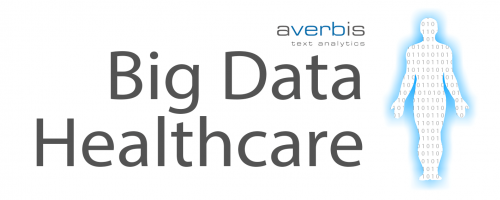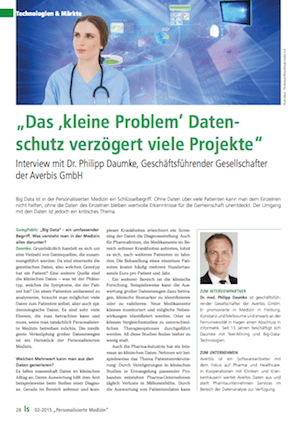BIG DATA IN HEALTHCARE
Stepping up research and enabling innovations
Big Data in Healthcare is a method of extracting important information from medical records.
Medical documents are analyzed according to diagnoses, symptoms, regulations, particular diagnosis features, as well as genetic information and systematically searched. Heterogeneous patient data in structured and unstructured form is harmonized and its content analyzed by means of text mining.

The term Big Data (‘large data volumes’) stands for large and complex volumes of data which are not evaluated by the conventional methods of analysis. Big Data is becoming more and more synonymous with technologies and processes which enable the collecting and analyzing of enormous amounts of data. For more information, see Wikipedia.
Healthcare (‘health care system’) includes all facilities, pharmaceutical and biotech companies, people and processes for health promotion and health preservation. For more information, see Wikipedia.
Big Data in Healthcare deals explicitly with data which is derived from the health sector and is relevant. This data is not termed Big Data solely due to its sheer volume, but rather because of its diversity and complexity.
SIGNIFICANCE OF BIG DATA IN THE HEALTHCARE SECTOR
More than 80% of medical and clinically-relevant data has yet to be structured. The corresponding data volumes are growing significantly faster than efficient processing is possible using conventional methods. The source systems generally possess various technical properties and database structures.
Data resources often emerge in different places: these immense volumes of data for example are generated in laboratories, in the field of imaging systems, in medical reports and in other medical documents, whereby significant amounts of relevant data are generated in CRM and in accounting billing systems.
Big Data in Healthcare thus makes an essential contribution to the steady improvement of health care, the promotion of economical and time-efficient research and new business models in the healthcare sector.
In clinics: Huge amounts of data are generated in clinic diagnostics every single day. But how are they used for the diagnosis of rare and complex diseases? Big Data analysis can be a decisive help. A search for symptoms and the course of disease helps the doctor to quickly find suitable medications and treatments, time-saving which can be crucial for the patient and cost savings which allows the treating clinic to operate economically.
In clinical research: The analysis of huge amounts of data helps to identify clinical biomarkers or validate these. New drugs can thus be monitored and possible side effects and interactions can be identified quickly. Comparative studies on various kinds of therapeutic treatment can be carried out as well.
In the pharmaceutical industry: The pharmaceutical industry needs clinical data for research. This is generated, among others, by clinical trials, for which suitable patients must be recruited. Lack of suitable patients causes leads to delays which lead to losses in the millions for pharmaceutical companies. Analyzing patient data can quickly show which patient is eligible for which clinical trial.
THE DEVELOPMENT OF BIG DATA IN THE HEALTHCARE SECTOR
Big Data in the healthcare environment is still in its infancy worldwide and its full potential is still far from exhausted.
Cost pressure from rising healthcare expenditure on the one hand and the innovation and competitive pressure from increased globalization on the other are forcing the players concerned in the health sector to redirect their thought processes.
Pharmaceutical, biotech companies and clinics are discovering more and more the potential of systematic analysis of their ‘Big Data inventories’.
Due to its restrictive data protection laws, compared to other countries, development in Germany is driving with the handbrake on. Hardy any progress has been made on the legal front in recent years, and access to patient data has been heavily restricted on the European level in the current draft of the European Data Protection Regulation. There is often a lack of objective and critical debate regarding the risks and opportunities of Big Data in the healthcare sector.
THE CHALLENGES WITH BIG DATA IN THE HEALTHCARE FIELD:
Traditionally, the healthcare sector is lagging behind other industrial sectors in the data processing and use of Big Data. This is however not due to a lack of innovation or investment power of the companies involved, rather it is for example the legal restrictions of data protection which only render the analysis of data in the health care sector possible under certain circumstances and in addition make it more complex than in other sectors.
Big Data and Healthcare – perpetual tension:
On the one hand, scientists and analysts need a comprehensive and accurate profile of the patient. What diseases and symptoms already exist? Which genotype does the patient have, what has his lifestyle been? Is he genetically pre-dispositioned? Only through comprehensive consideration is it possible to identify the typical course of a disease and thus achieve the improvement of active ingredients.
However the persons and companies rendering treatment naturally have to protect and respect patient privacy.
This tension requires the utmost professionalism in the development of appropriate analysis software. Evaluation of the data is carried out with the highest safety precautions, i.e. onsite at the clinic. At no time do the software developers involved have any access to the data. This requires software development that meets the highest possible quality standards.
BIG DATA IN THE HEALTHCARE SECTOR –
TEXT MINING IN THE HEALTHCARE SECTOR
Averbis’ analysis and Text Mining method: exact data and thus valuable knowledge can be extracted from huge data volumes consisting of unstructured texts, studies and documentation – knowledge which enables improved patient care and prognosis and thus leads to a healthier life.
Example Radminer Report on Radminer: ÄrzteZeitung
GOING PUBLIC IN AN INTERVIEW WITH DR. PHILIPP DAUMKE, CEO OF AVERBIS

“THAT LITTLE PROBLEM DATA PROTECTION IS DELAYING MANY PROJECTS”
About the magazine Going Public:
For more than 15 years now, the magazine ‘Going Public’ has stood for topics in the field of Corporate Finance Business and is the leading publication for IPO’s in German-speaking countries in Europe.
The column ‘Life Sciences’ is a vital branch- and technology-related focus of Going Public. In addition to cover stories, topical focuses and transaction reporting, up to five specials are published annually on selected topics. For more information, contact Going Public.
In issue number 02-2015, Anne Hachmann interviewed Averbis CEO Dr. Philipp Daumke about ‘Personalized medicine’.

